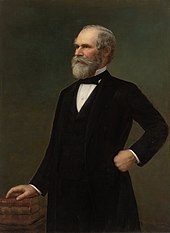Galusha A. Grow
Galusha A. Grow | |
|---|---|
 | |
| 24th Speaker of the United States House of Representatives | |
| In office July 4, 1861 – March 4, 1863 | |
| Preceded by | William Pennington |
| Succeeded by | Schuyler Colfax |
| Leader of the House Republican Conference | |
| In office July 4, 1861 – March 4, 1863 | |
| Preceded by | William Pennington |
| Succeeded by | Schuyler Colfax |
| Member of the U.S. House of Representatives from Pennsylvania | |
| In office March 4, 1851 – March 3, 1863 | |
| Preceded by | David Wilmot |
| Succeeded by | William Henry Miller |
| Constituency | 12th district (1851–53) 14th district (1853–63) |
| In office February 26, 1894 – March 3, 1903 | |
| Preceded by | William Lilly |
| Succeeded by | John M. Morin (1913) |
| Constituency | at-large district |
| Personal details | |
| Born | Aaron Galusha Grow August 31, 1823 Ashford, Connecticut, U.S. |
| Died | March 31, 1907 (aged 83) near Scranton, Pennsylvania, U.S. |
| Political party | Democratic (1850–57) Republican (1857–1907) |
| Alma mater | Amherst College |
| Profession | Attorney |
| Signature | |
Galusha Aaron Grow (August 31, 1823 – March 31, 1907) was an American politician, lawyer, writer and businessman, who served as 24th
Elected speaker for the
After leaving office he continued to speak out on political issues, but did not serve in elective office. Then, 31 years after leaving office, Grow won an 1894 special election to succeed William Lilly. It remains one of the longest known interregnums between terms of service for a House member. Over the course of his career, Grow represented the people of three Pennsylvania congressional districts: the 12th district (1851–1853), 14th district (1853–1863), and Pennsylvania's at-large congressional district (1894–1903).
Early life and education
Grow was born Aaron Galusha Grow in Ashford, Connecticut. His given names were the suggestions of an aunt living in Vermont, who was visiting Grow's mother when he was christened: "Aaron" was the aunt's husband's name (his full name was Aaron Nichols (1764–1807)), and "Galusha" was the surname of a governor of Vermont she admired.[2] His family called him Galusha when he was growing up, and before Grow was a teenager, he had started writing his name with his given names reversed.[2] He was educated at Franklin Academy in Susquehanna County, Pennsylvania, and later at Amherst College. He studied law and was admitted to the bar in November 1847 and then began his law practice.[3]
Political career


Early elections
Grow ran as a
Congressional brawl of 1858
During the
Later that year Grow was
1861 speaker election
The deepening rift between
1861 election for speaker – 159 votes cast, 80 votes necessary to win election:[11][12]
■ Galusha A. Grow (R–Pennsylvania) 99
■ Francis Preston Blair Jr. (R–Missouri) 12
■ John J. Crittenden (U–Kentucky) 12
■ John S. Phelps (D–Missouri) 7
■
■ Erastus Corning (D–New York) 7
■ Samuel S. Cox (D–Ohio) 6
■ Others 9
Although events of the war dominated and the
Loss of congressional seat and interim
Grow, a supporter of the Radical Republicans, was defeated in his re-election bid in 1862, becoming the second sitting House Speaker in a row to lose his seat.
Grow was a delegate to the Republican National Convention in
He moved to
Return to Congress

Grow returned to the United States Congress as a
Death and legacy
Grow resided in
A monument to Grow was erected in 1915 at the Susquehanna County Courthouse Complex in Montrose, Pennsylvania.[13]

See also
- List of American politicians who switched parties in office
- List of United States representatives who switched parties
References
- ^ "Thomas Foley, House Speaker, Dies at 84". New York Times. October 18, 2013. Retrieved March 21, 2014.
- ^ a b c d Galusha A. Grow: Father of the Homestead Law from Google Books
- ^ United States Congress. "Galusha A. Grow (id: G000507)". Biographical Directory of the United States Congress.
- ^ Allan L. Damon (December 1975). "Filibuster". American Heritage Magazine. 27 (1). Archived from the original on September 29, 2007.
- ^ Cong. Globe, 35th Cong., 1st Sess. 603 (1858) Archived August 3, 2017, at the Wayback Machine.
- ^ Nilsson, Jeff (December 4, 2010). "Beatings, Brawls, and Lawmaking: Mayhem in Congress". The Saturday Evening Post. Retrieved April 13, 2019.
- ^ Ostermeier, Eric (October 30, 2015). "House Speaker Elections by the Numbers". Minneapolis, Minnesota: University of Minnesota Libraries. Retrieved April 15, 2019.
- ^ "US House Speaker (1859–60)". Our Campaigns. Retrieved April 15, 2019.
- ^ "The Near Duel Between Representatives Galusha Grow of Pennsylvania and Lawrence Branch of North Carolina". US House of Representatives: History, Art & Archives. Retrieved March 11, 2019.
- ^ "The Independence Day Election of Pennsylvania Representative Galusha A. Grow as Speaker of the House". Historical Highlights. Washington, D.C.: Office of the Historian, U.S. House of Representatives. Retrieved April 13, 2019.
- ^ Cong. Globe, 37th Cong., 1st Sess. 4 (1861)
- ^ "US House Speaker (1861)". Our Campaigns. Retrieved April 13, 2019.
- ^ "National Historic Landmarks & National Register of Historic Places in Pennsylvania" (Searchable database). CRGIS: Cultural Resources Geographic Information System. Note: This includes David L. Taylor (February 1996). "National Register of Historic Places Inventory Nomination Form: Susquehanna County Courthouse Complex" (PDF). Retrieved December 30, 2012.[permanent dead link]
External links
- Galusha Grow from Mr. Lincoln's White House, a website of the Lehrman Institute
- Grow, Galusha Aaron (1823-1907) from The Political Graveyard
- . Appletons' Cyclopædia of American Biography. 1892.
- Galusha A. Grow at Find a Grave


